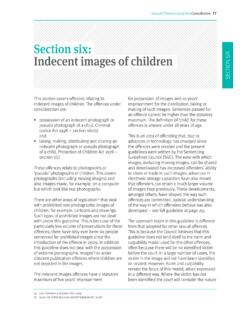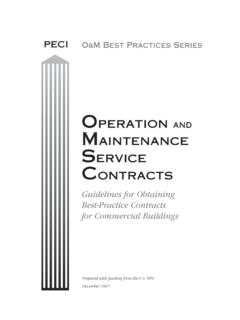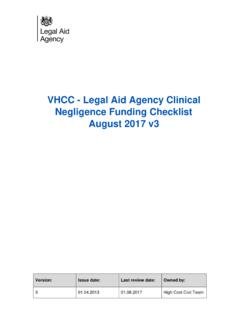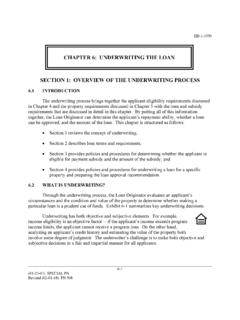Transcription of Annex C: The Current Legal Aid Financial Eligibility Rules ...
1 Annex C The Current Legal Aid Financial Eligibility Rules Summary In order to understand our proposed changes to the Financial Eligibility Rules we have set out below a summary of the Current Rules for comparison. This is a basic overview and is not meant to be a detailed outline of the means tests including all the different exceptions. The framework for the provision of civil and criminal Legal aid is contained in Part 1 of the Legal Aid, Sentencing and Punishment of Offenders Act 2012 (LASPO). The Rules on Financial Eligibility are set out in section 21 of LASPO and regulations made under that section.
2 The Rules on contributions to be made by an individual to that person s Legal aid costs are set out in section 23 of LASPO and regulations made under that section. The relevant regulations are: the Civil Legal Aid ( Financial Resources and Payment for Services) Regulations 2013 (SI 2013/480) 1; the Criminal Legal Aid ( Financial Resources) Regulations 2013 (SI 2013/471) 2; the Criminal Legal Aid (Contribution Orders) Regulations 2013 (SI 2013/483); and the Criminal Legal Aid (Recovery of Defence Costs Orders) Regulations 2103 (SI 2013/511).
3 Civil Legal aid Civil Legal aid provides support for claimants in civil disputes requiring Legal advice, mediation or representation in court. The Civil Legal Aid ( Financial Resources and Payment for Services) Regulations 2013 ( Civil Financial Regulations ) set the Rules for all forms of civil Legal services. Civil Legal aid is not means tested for certain types of proceedings, for example, for children, parents and those with parental responsibility in care proceedings. None of the proposals in this document seek to change the Current exceptions from the means test.
4 Civil Legal aid is also subject to a merits test. The merits test to be applied varies according to the type of Legal services provided and the category of law to which the application relates. The means tests Where civil Legal aid is means tested, the means test looks at both the applicant s income and capital. The general rule is that the resources of the partner of the individual applying for Legal aid are to be included in the calculation of the Financial resources of the applicant. However, resources are not to be aggregated if the individual has a contrary interest in the dispute in respect of which the application is made.
5 In order to be eligible for civil Legal aid, the applicant must pass both the income and the capital Eligibility test. 1 2 Full details of how the determination of how much income and capital a person has is made can be found in the Civil Financial Regulations. Gross income test The gross income test is an upper threshold, above which an applicant will not be financially eligible for civil Legal aid. This upper threshold is where an applicant has a gross monthly income which exceeds 2, An applicant who is in receipt, directly or indirectly, of qualifying benefits4 automatically satisfies the gross income test.
6 This is called passporting . Disposable income and disposable capital tests If an applicant satisfies the gross income test, account is then taken of the applicant s disposable income and disposable capital in order to assess whether they are eligible for civil Legal aid. If an applicant s disposable income or their disposable capital are above the relevant limits, the applicant will not be eligible for civil Legal aid. An applicant who is in receipt, directly or indirectly, of qualifying benefits automatically satisfies the disposable income test.
7 Those in receipt of qualifying benefits must, however, satisfy the disposable capital test. An applicant who is in receipt of other benefits may have those benefits disregarded for the purposes of the Financial Eligibility calculation. Subject to the exceptions described below, an applicant will be eligible for civil Legal aid where their monthly disposable income does not exceed 733 and their disposable capital does not exceed 8,000. The exceptions are where the applicant is seeking Legal representation in respect of certain immigration matters before the First-tier Tribunal or the Upper Tribunal.
8 In those cases, an applicant will be eligible for civil Legal aid where their disposable monthly income does not exceed 733 and their disposable capital does not exceed 3,000. Waiver of Eligibility limits The Eligibility limits may be waived in certain circumstances. For example, in certain proceedings relating to domestic violence, female genital mutilation and forced marriage the Eligibility limits may be dis-applied if it is considered equitable to do so. Thus an individual applying for Legal aid for such cases may still receive Legal aid even if their income or capital exceeds the Eligibility limits described above.
9 Contributions Applicants who satisfy the gross income, disposable income and disposable capital tests may be required to make contributions towards the cost of their Legal aid. In respect of the types of civil Legal aid, in some a contribution will be required from the applicant and in some no contribution may be required from the applicant. We are not proposing to make any change to this split. 3 The upper limit is higher for those with four or more dependent children in respect of whom the individual receives child benefit an increment of 222 is added for the fifth and each subsequent child.
10 4 Qualifying benefits are currently income support, income-based jobseeker s allowance, income-based employment and support allowance, state pension guarantee credit and universal credit. Work for which no contribution is required from the applicant: (a) Legal Help; (b) Help at Court; (c) Help with Family Mediation; (d) Family Mediation; (e) Family Help (Lower); (f) Legal Representation for certain immigration proceedings; and (g) Any other civil Legal services as are the subject of a determination under section 10 of LASPO.








